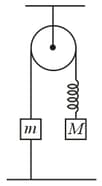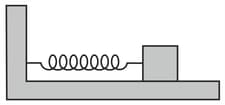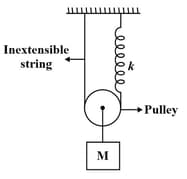Oscillations of a Spring - Block System
Oscillations of a Spring - Block System: Overview
This topic covers concepts, such as, Spring - Block System etc.
Important Questions on Oscillations of a Spring - Block System
A block of mass is placed on a smooth horizontal surface, and it is pulled by a light spring as shown in the diagram. If the ends and of the spring are moving with and respectively in the same direction and at this moment the rate at which spring energy is increasing is , then what is the value of spring force (in )?

A mass of is attached to the lower end of a massless spring of force constant , the upper end of which is fixed to a rigid support. Which of the following statement is true?
An arrangement of spring, strings, pulley and masses is shown in the figure below.

The pulley and the strings are massless and . The spring is light with spring constant . If the string connecting to the ground is detached, then immediately after detachment
Two blocks of masses and are moving with speed and in the same direction on the frictionless surface respectively, being ahead of . An ideal spring of force constant is attached to the backside of (as shown). The maximum compression of the spring when the blocks collide is

Angular frequency in SHM is given by . Maximum acceleration in SHM is and maximum value of friction between two bodies in contact is , where N is the normal reaction between the bodies.
Now the value of k, the force constant is increased, then the maximum amplitude calculated in above question will
Electrostatic force on a charged particle is given by . If q is positive and if q negative
In the figure mA = mB = 1 kg. Block A is neutral while qB = - 1C. Sizes of A and B are negligible. B is released from rest at a distance 1.8 m from A. Initially spring is neither compressed nor elongated.

Equilibrium position of the combined mass is at
At the instant speed of block is maximum, the magnitude of force exerted by spring on the block is:
Let be the spring constant of a spring. If the spring is cut into two equal parts, then spring constant of each part is
The time period of mass when displaced from its equilibrium position and then released for the system as shown in figure is
Match the Column I with Column II:
| Column - I | Column - II | ||
|---|---|---|---|
 |
|
||
 |
|||
 |
|||
 |
A trolley of mass , as shown in figure, is connected to two identical springs, each having spring constant equal to . If the trolley is displaced from its equilibrium position by and released, the maximum speed of the trolley is:

A spring balance has a scale that reads from to . The length of the scale is . A block of mass is suspended from this balance, displaced from its mean position and released, it oscillates with a period . The value of is (Take )
Two blocks each of mass , kept on smooth surface, are connected by a spring of spring constant as shown in the figure.

If the blocks are displaced slightly in opposite directions and released, they will execute simple harmonic motion. The time period of oscillation is
Natural length of the spring is and its spring constant is A mass of is hung from it. The extension produced in the spring is
(Given )
A spring having a spring constant of , is mounted on a horizontal table, as shown in the figure. A mass of is attached to the free end of the spring. Then, the mass is pulled sideways to a distance of and released. Determine the maximum acceleration of the mass, and the maximum speed of the mass.

A solid copper sphere is suspended from a massless spring. The time period of oscillation of the system is 4 second. The sphere is now completely immersed in a liquid whose density is 1/8 th that of brass. The sphere remains in liquid during oscillation. Now the time period is

